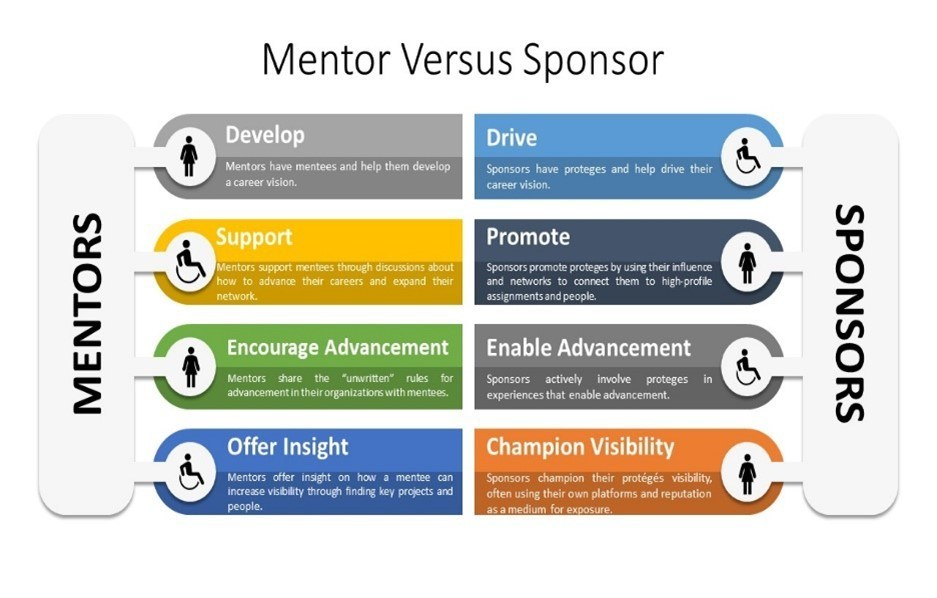AuthorWrite something about yourself. No need to be fancy, just an overview. Archives
April 2024
Categories |
Back to Blog

Mentor, sponsor, coach, advocate, role model, advisor, guide, counselor. At first glance, these all seem quite similar. Each word evokes thoughts of a relationship between a more senior-level employee and their more junior protege. However, in practice, there are nuances within each role definition that provides significantly different value to both your employees and organization. In the book “Forget a Mentor, Find a Sponsor,” Sylvia Ann Hewlett digs deeper into the difference between the two roles. In particular, Hewlett makes a bold case in support of finding a sponsor over a mentor (although she does also articulate the value of mentorship as well, despite the tongue-in-cheek title). In my role as an HR leader, I’ve experienced the value of having both a mentor and a sponsor. In my first role as an HR Business Partner, I was lucky to have an extremely strong mentor who helped provide me with a safe space to learn, grow and ask questions. She acted as a catalyst for my development into the role and, to this day, is someone I can lean on for help (despite the fact that both of us have since moved into different positions). Beyond the learning and development that mentorship afforded me, sponsorship from a key HR leader helped get me to where I am today as HR Director. Having a senior leader who realized my potential, and intentionally put me in spaces where I could shine, accelerated not just my development but also my own career advancement. The combination of the mentor and sponsor approach put me in a position where I was able to simultaneously grow my career and contribute in the most meaningful way possible to the work that needed to be done at my organization. I’d argue that, while mentorship can and does provide a significant amount of value for your employees in support of their growth and development, sponsorship, in addition to mentorship, can take employee growth development to the next level and realize significant value for both your employees and for the organization as a whole. In this article, I’ll cover:
What is mentorship?Mentorship is an organized approach to matching more experienced employees to more junior ones. The more seasoned individuals act as trusted coaches or advisers to support the junior employee’s growth and professional development. Mentor/mentee relationships can vary in their level of formality. When done well, organizations create strategically built mentoring programs that align individuals with the right competencies, skills, and knowledge to help develop the next wave of talent within their organization. Successful mentorship gives mentees space to focus on their career development, career vision, and the creation of a plan to build the skillset they need to realize their aspirations. Benefits of mentorshipDrive Colleague DevelopmentMentorship is a critical component of any formal employee learning and development program, providing mentees with social learning in addition to the formal learning they get through coursework and experiential learning they gain on the job. Mentorship relationships allow mentees to gain new skills, perspectives, and relationships in a safe space outside of a formal hierarchical/managerial relationship. This is essential in helping mentees gain the knowledge, skills, and abilities needed to be successful in the role they are in today or aspirational roles they hope to grow into within your organization. Internal MobilityDeveloping your employee’s capabilities opens the door for internal mobility and personal growth within your organization, both of which are critical from an employee retention and engagement perspective. Mentorship can help expose your mentees to other parts of the organization and build out their professional network at your company. This, combined with helping ensure they have the right critical skills, can be a catalyst to help them ascend to new roles as they emerge. What is sponsorship?Sponsorship, in a way, transcends mentorship. Mentorship is certainly a component of the relationship and perhaps how it begins, but successful sponsorship takes the relationship to a whole new level. An easy way to think about sponsorship is mentorship with action--it’s an active effort on the part of the sponsor to use their network, connections, and potentially even their authority to help influence the career growth and advancement of the individual they are sponsoring.
Those opportunities could be their next project, a promotion opportunity, or a new role within the organization. The sponsor is staking their own credibility and potentially their own success on the individual whom they are championing. Sponsorship is therefore predicated, not just upon a high level of trust, but a deep-seated belief in the sponsee’s ability to be successful in the opportunities they get recommended for. Benefits of sponsorshipDrive organizational success and business growthUltimately the largest benefit is the success and growth of your business. Your talent is your greatest asset and your ability to deploy that talent in the most impactful way is paramount. Sponsorship can help ensure you have the right people in the right roles at the right times to support your organizational needs. Retain high-potential talentToday’s war for talent is highly competitive and it’s more cost-effective to retain talent. One of the best ways we can retain top talent is to give them the right space to grow and develop within our organization. We often find unique talent within our teams who have the ability to grow above and beyond their roles, even if that means moving to other parts of our organization. Taking a strategic approach to these high-potential employees, and sponsoring their ability to find internal mobility opportunities, is one of the strongest ways we can keep our best talent working for us. Impact organization DEI effortsBeing intentional about sponsoring employees in underrepresented demographics is a great way to drive diversity, equity, and inclusion at your company. Women and people of color, in particular, can benefit from sponsorship, especially in the tech space and other industries where these groups are woefully underrepresented. Mentorship vs SponsorshipHere’s a quick side-by-side view to help see the subtle shift in thinking when moving from mentor or sponsor. How to foster mentorship and sponsorship in your organization?So how do you get started with fostering mentorship and/or sponsorship at your company? The extent to which you invest in both mentorship and sponsorship is going to depend greatly upon the maturity of your talent processes and the unique needs of your organization. Like all HR processes, mentorship and sponsorship efforts needs to map back to your organization’s needs and talent strategy. Identify your needsStart by asking yourself questions like:
Once you’ve isolated the needs you are trying to address through mentorship and sponsorship you can begin to build out a program designed to meet those needs. Fostering mentorshipMentorship is generally driven through formal mentoring programs. I would encourage you to check out our “How To Start An Effective Mentoring Program In 6 Steps” article for a detailed overview of how to build out a program at your organization. Fostering sponsorshipSponsorship, meanwhile, isn’t often accomplished through a formal program. However, it does benefit from structure and agreement across your leadership team. Ultimately, successfully utilizing sponsorship comes down to three key things:
A best practice is for your leadership team to leverage your organizational talent review processes, or other formal talent discussions, as an opportunity to talk about your approach as well as the key talent that you are investing in through sponsorship. Conclusion: mentorship and sponsorship—why it’s good to utilize both in an organizationIt’s abundantly clear that both mentorship and sponsorship have a role in nurturing and retaining talent. It certainly shouldn’t be an “either/or,” but rather an “and” as both play a distinct role in how you grow and develop talent within your organization. Mentorship without sponsorship doesn’t allow you to invest specifically in the career success of your highest potential talent. On the other hand, sponsorship without true mentorship leaves a significant portion of your population undiscovered and unsupported in their personal growth and development. However, together, mentorship and sponsorship can help you grow, develop, retain and deploy all talent across your organization. Interested in learning more? I’d highly recommend Sylvia Ann Hewlett’s “Forget a Mentor, Find a Sponsor” (a fascinating read). You can also utilise mentoring software to help you launch and run your mentoring program and match mentors with mentees. The post Mentorship vs Sponsorship: What’s The Difference Why You Should Utilize Both appeared first on People Managing People. via People Managing People https://ift.tt/V67Qv2q
0 Comments
Read More
Leave a Reply. |
 RSS Feed
RSS Feed

